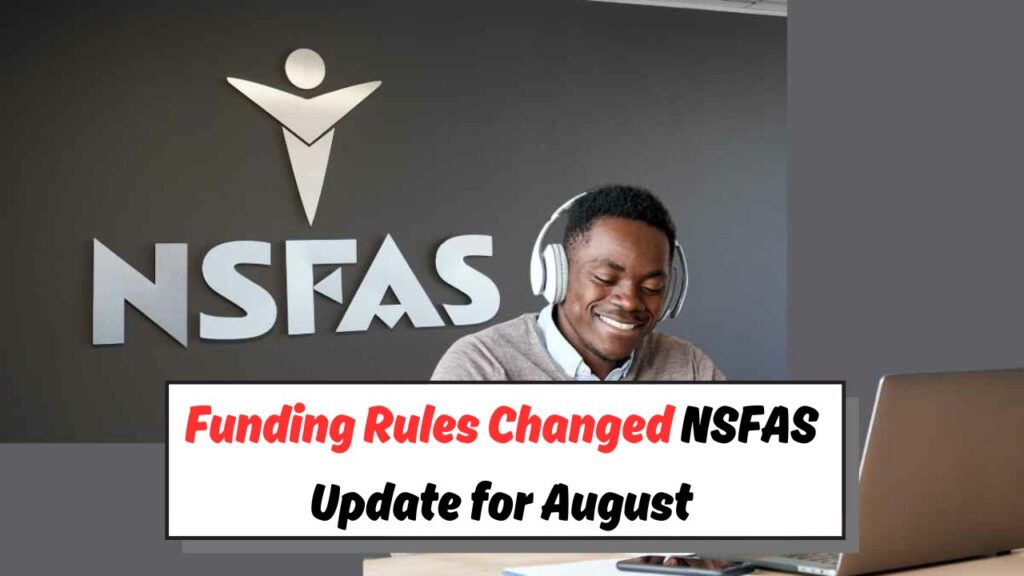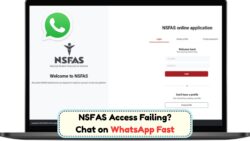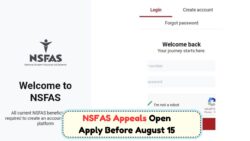New NSFAS Funding Rules – The National Student Financial Aid Scheme (NSFAS) has introduced a series of important funding rule changes for the 2025 academic year, aimed at improving accountability, eligibility, and the efficiency of fund distribution. With the new academic cycle approaching, thousands of returning and first-time students are urged to familiarize themselves with these latest updates to avoid disqualification or missed opportunities. In August 2025, NSFAS rolled out revised funding policies that apply to both university and TVET college students. These include stricter academic progression requirements, new allowances for transportation and textbooks, and clearer criteria for maintaining funding eligibility. The goal is to ensure that funding is awarded to students who demonstrate both financial need and academic dedication. One of the most notable changes is the introduction of capped allowance structures for specific categories such as transport and accommodation. NSFAS has also begun flagging irregular academic progression and duplicate applications more rigorously, a move expected to prevent fraud and misuse. Moreover, institutions are now required to confirm student registration and attendance earlier in the academic year, affecting when allowances will be paid out. This article provides a complete breakdown of the new NSFAS funding rules for 2025, the updated allowance amounts, academic requirements, and key deadlines students need to be aware of. If you’re currently funded or planning to apply, read this guide carefully to stay compliant and avoid missing out.
Key NSFAS Funding Changes Implemented in 2025
Here are the major policy changes every NSFAS student must know before August 2025:
- Updated academic progression requirement: Pass at least 50% of modules.
- New capped transport allowance: Max R1,500 per month.
- Book allowance introduced for university students: R5,200 annually.
- Accommodation payments limited by region-specific caps.
- Automatic suspension for failure to submit registration confirmation.
- No dual funding: NSFAS checks other bursary overlaps.
- Final year funding only allowed if within N+2 rule compliance.
Academic Eligibility Criteria for 2025 Funding
NSFAS has outlined specific academic rules for new and returning students to qualify for continued support:
- First-year students must have passed their matric with admission to bachelor, diploma, or higher certificate programs.
- Returning students must have passed at least 50% of the modules in the previous year.
- Students exceeding the N+2 rule (duration of qualification + 2 years) will be automatically defunded.
- Defunded students may reapply after meeting recovery academic targets.
Updated NSFAS Allowance Structure for 2025
NSFAS has officially revised the allowance structure, adding clarity and caps on certain expenses. Here’s the new breakdown:
| Allowance Type | Amount (Monthly/Annual) | Applicable To | Notes |
|---|---|---|---|
| Living Allowance | R1,650/month | University Students | Paid directly to bank accounts |
| Transport Allowance | R1,500/month (max) | All Students | Within 40km of institution |
| Book/Study Material | R5,200 annually | University Students | New in 2025 |
| Accommodation (Urban) | R5,850/month (max) | University Students | Subject to rental caps |
| Accommodation (Peri-Urban) | R3,400/month (max) | University Students | Subject to regional rate limits |
| Incidental Allowance | R304/month | TVET Students | Only for students in NSFAS residences |
| Distance Learning | R5,200 annually | Distance Students | If more than 10 modules/year |
Key Differences for University and TVET Students
TVET students receive allowances slightly differently and are subject to fewer categories:
- No book allowance for TVET students.
- Accommodation is institution-managed only.
- Transport and incidental allowances may vary.
NSFAS Compliance Rules and N+2 Policy Explained
NSFAS has implemented strict guidelines to monitor academic progress and ensure that students complete their qualifications within a reasonable timeframe.
- N+2 Rule: Funding will only be provided for the duration of the course (N years) plus 2 additional years.
- If a student fails too many modules and cannot complete within the N+2 window, they will be excluded from further funding.
- This rule applies to both universities and TVET colleges.
- Special appeals may be considered in cases of illness or family crisis with proper documentation.
Steps to Remain in Good Standing with NSFAS
Students are advised to follow these steps to maintain their funding:
- Attend classes regularly and maintain a minimum 50% module pass rate.
- Confirm registration with your institution before deadlines.
- Update contact and banking details on the NSFAS portal regularly.
- Submit supporting documents if asked during reviews or audits.
Deadlines and Reapplication Window for 2025
Missing key deadlines could mean losing your NSFAS support. The reapplication and appeal timelines are critical:
| Task | Deadline | Notes |
|---|---|---|
| Registration Confirmation | 15 August 2025 | Institutions submit confirmation to NSFAS |
| Appeal for Funding Rejection | 20 August 2025 | Only valid for rejected new applications |
| Reapplication for Defunded Students | 25 August 2025 | Must include improved academic performance report |
| Banking Details Update Deadline | 30 August 2025 | Affects allowance disbursement in September |
| Change of Institution Notification | 31 August 2025 | Must be submitted via myNSFAS portal |
What If Your NSFAS Funding Is Suspended?
Suspension doesn’t mean permanent cancellation. You can appeal if you were defunded due to:
- Poor performance caused by documented illness or family emergencies.
- Administrative errors by your institution or NSFAS.
- Discrepancy in module registration or N+2 interpretation.
Additional Information for New Applicants
New applicants for 2026 are also advised to take note of policy changes in 2025 as they will likely continue or evolve:
- You must apply through the official myNSFAS portal.
- Supporting documents (ID, income proof, academic results) are mandatory.
- SASSA grant recipients are automatically considered financially eligible.
- Applications for 2026 are expected to open in November 2025.
Preparing for Application: Required Documents
Ensure you gather the following documents in advance:
- Certified copy of your ID
- Parent or guardian ID copies
- Proof of income (or affidavit if unemployed)
- Recent academic report or matric certificate
- Proof of registration or acceptance letter from the institution
Departmental Contact Details and Support Channels
If you need help or want to raise a query, contact NSFAS through the following official channels:
| Department | Contact Details |
|---|---|
| General Enquiries | info@nsfas.org.za |
| Appeals Department | appeals@nsfas.org.za |
| Toll-Free Number | 08000 67327 |
| WhatsApp Support | +27 78 519 8006 |
| NSFASZA | |
| Twitter/X | @myNSFAS |
| Website | www.nsfas.org.za |
These updated NSFAS rules for 2025 represent a major shift toward a more performance-based funding model. Staying informed and compliant is crucial to avoid losing support or missing key opportunities.
Frequently Asked Questions (FAQs)
1. Can I get funding if I failed more than 50% of my modules?
No, you must pass at least 50% of your modules to remain eligible.
2. Is the R5,200 book allowance for all students?
No, only university students receive this allowance in 2025.
3. What is the maximum period I can be funded?
You can be funded for N+2 years (qualification length + 2 extra years).
4. Do SASSA recipients still qualify automatically?
Yes, SASSA recipients remain automatically financially eligible.
5. Can I change institutions mid-year and still get funded?
Yes, but you must inform NSFAS via the myNSFAS portal before the deadline.






